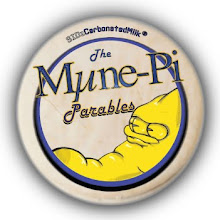Stop me, if you've heard this one. A theist and an atheist walk into a bar. The theist asks, "How're you doing, Cal?"
The atheist gruffly responds, “I don't appreciate your asking; let's keep our conversations restricted to only professional matters from now on."
Cut to "The Mμne-Pi Parables"—cut: two …“(Humming) 'cross the Chorus of Gleeful Idiocy". It takes place at a cosmic cocktail party, where believers and non-believers are gathered, and inevitably related discussions arise. The listener will be transported into this surreal soiree where surrounding dialogue will vary from staunch literal Bible beliefs to defending current contemporary consensus morality to extremely firm disbelief and dismissal of anything deemed religious. Streams of expressed candid opinions pan out across the soundstage counter-intuitively underscored with ominous incidental music.
What has proven a surprisingly difficult task in "...Gleeful..."'s production is actually finding non-believers willing to speak out on their disbeliefs. It's odd because societally we Westerners tend to be quite vocal about our opinions. Ask if frog’s legs really taste like chicken and [ding! “Pick up!”]…steaming hot opinion served just like that. It’s highly unlikely that one would confront acrimonious objections to queries about opinions concerning television shows. One might argue against any analogy applications holding television and religion in similar regard, but Americans (especially)—purporting to be spiritual—probably spend more time in front of TV than in reverent audience before their G(g)od(s). And on Oscar Sundays, movies (a.k.a. TV, Sr.) are given the high celebratory esteem of the original Palm Sunday parade. Their reticence to come forth with deep, meaningful contributions is reminiscent of those kidnap movie scenes where the extortionists emphatically demand that their ransom targets have absolutely no contact with the proper authorities. So bound by fear of indirectly causing impending loss, they will endeavor to work out their problems on their own—in wonted futility.
And of course, there are some who will play the never speak on religion or politics-card—holding to a stated desire to keep peace. But might that be as much merely a head-in-sand…be quiet and maybe it'll just go away-tact? It could be a cultural thing. I've yet to encounter a person of color so easily offended by God-talk as those conversely colorless […I suppose].
Perhaps it is the song title itself; some may feel insulted by it, or even maybe intimidated. The title ["(Humming) 'cross the Chorus of Gleeful Idiocy"] serves as an intrusive revealing mirror…even as a philosophical litmus test, MRI, or X-ray. As one side will see their adversarial counterparts as the gleeful idiots, they'll simultaneously perceive themselves as earnest purveyors of the real truth in these matters.
The Bible states that a fool says there is no God; the unbeliever believing in no existence of a god (and of course not the capitol ol’ “G”), is left to †believe that said evidence has been compromised by tampering, and as such is rendered inadmissible in any responsible debate. The atheist (or agnostic), views the believer as one so arrogant as to sincerely believe that there exists some great cosmic creator/emperor who, having single-handedly created the expanses of the universe and beyond, would even bother to communicate His thoughts to lowly microbial mankind. While in his arrogance, the atheist asserts in confidence that the universe is self-created, and intelligent man is its' crowning organic achievement. ...unless of course, the aliens show up in their flying saucers to unseat us all. Check the ice on Mars!
†”There are no non-believers; everyone believes in something, even if their belief is that they believe in nothing.”—Ijussedit Jussnow
2009
Wednesday, December 16, 2009
Subscribe to:
Post Comments (Atom)


No comments:
Post a Comment